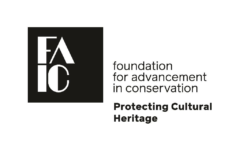 Participants will be introduced to the identification, degradation, and preservation of common photographic print materials, including the salted paper, albumen, silver gelatin, and chromogenic color processes. Ethical and other factors to consider in the preventative care of at-risk print materials will be outlined. We will address early direct positive processes – the daguerreotype, ambrotype and tintype – briefly. We’ll also discuss details pertaining to the manufacture, identification and preservation of gelatin dry plate and film-base negatives, along with basic considerations in the care of photographic albums. We’ll review preservation challenges related to large and diverse photographic collections with attention paid to the importance of proper environments and storage materials, emergency planning, and risk analysis. The value and significance of photography, global initiatives, and the pressing need to secure external funding and support through effective preservation advocacy will be emphasized throughout the webinar. Participants will receive a small selection of historic prints, to be returned at the conclusion of the webinar, for in-depth study. A listing of key publications and online resources will be provided. While each session will start with a webinar presentation, but we will include time for discussions with questions welcomed during or following each session using Zoom meeting.
Participants will be introduced to the identification, degradation, and preservation of common photographic print materials, including the salted paper, albumen, silver gelatin, and chromogenic color processes. Ethical and other factors to consider in the preventative care of at-risk print materials will be outlined. We will address early direct positive processes – the daguerreotype, ambrotype and tintype – briefly. We’ll also discuss details pertaining to the manufacture, identification and preservation of gelatin dry plate and film-base negatives, along with basic considerations in the care of photographic albums. We’ll review preservation challenges related to large and diverse photographic collections with attention paid to the importance of proper environments and storage materials, emergency planning, and risk analysis. The value and significance of photography, global initiatives, and the pressing need to secure external funding and support through effective preservation advocacy will be emphasized throughout the webinar. Participants will receive a small selection of historic prints, to be returned at the conclusion of the webinar, for in-depth study. A listing of key publications and online resources will be provided. While each session will start with a webinar presentation, but we will include time for discussions with questions welcomed during or following each session using Zoom meeting.
Following completion of the webinar, expected competencies and knowledge for all participants include:
- Familiarity with the fundamental physical and chemical properties of photographic print and negative collections and the causes and mechanisms of their deterioration.
- Basic knowledge of the technological developments of photography in the 19th, 20th and 21st centuries with special focus on albumen, silver gelatin, and chromogenic print materials and glass plate and film base negatives.
- The ability to distinguish prominent 19th- and 20th-century photographic processes and to assess and articulate their preservation risk.
- Understanding of and appreciation for issues relating to preventive care of photographic collections, including appropriate environmental conditions; handling and maintenance procedures for storage; exhibition and display parameters and monitoring techniques; and emergency preparedness, mitigation, and response.
- Basic knowledge of best practices in photograph preservation and an understanding of the importance of risk assessment and preservation prioritization within a collection and the need to balance preservation and access.
- Appreciation for advocacy in the preservation of global cultural heritage. The ability to articulate why the preservation of our photographic heritage is vital and relevant.
Course Schedule
September 13, 2022 12:00-1:15pm ET
- We Can Work it Out: Day one will focus on the value and significance of photography with a goal toward strengthening advocacy skills, critical to the preservation of our photographic heritage. We will also address basic chemical principles and the material characteristics and components of photographic print and negative materials. This session will conclude with a brief discussion of early direct positive images – their manufacture and preservation challenges. Key text and online resources will be shared.
September 15, 2022 12:00-1:15pm ET
- The Long and Winding Road: Day two will center entirely on 19th-and 20th-century photographic print materials: manufacture, identification, and deterioration with an emphasis on dominant processes, especially albumen, silver gelatin, and chromogenic. Participants will examine and study photographic print samples provided.
September 20, 2022 12:00-1:15pm ET
- Help! Day three will center on 19th – and 20th- century photographic negative materials, including their manufacture, identification, deterioration, and preservation. Issues pertaining to the care of large, at-risk collections will be pursued. The value and significance of these amazing cultural records will be emphasized.
September 22, 2022 12:00-1:15pm ET
- Eight Days a Week: Day four will examine photographic collections and holdings more holistically. Building on your collective knowledge of photographic print and negative materials and their vulnerabilities, this day will center on preservation planning and prioritization, fundamental concepts relating to collections care and emergency preparedness, and some of the types of collections, such as albums or lantern slides, typically held by collecting institutions that require our attention.
September 27, 2022 12:00-1:15pm ET
- (Don’t) Let it Be and Across the Universe: Our final session will further review conclusions and collection care strategies shared in day four and return to our initial discussion from day one on the value and significance of our photographic heritage. Here we will address opportunities to actively engage and partner with institutional leadership and community members in our preservation efforts. Guidance centered on fundraising and development approaches – from foundations to corporate and individual donor investment – will be shared. Final questions on all topics related to the webinar content and next steps will be welcomed.
Coordinator/Instructors
This course is coordinated and taught by Debra Hess Norris, Chair and Professor of Photograph Conservation, Art Conservation Department, University of Delaware (UD), and Director of the Winterthur/University of Delaware Program in Art Conservation (WUDPAC). For the past 40 years, Debra Hess Norris has authored 45 book chapters and articles and led 160+ workshops globally centered on the care and preservation of photographic materials, while working in partnership with conservation and allied professionals and community members, to strengthen awareness and relevant collection care practices globally from Benin to Beijing, Boston to Bogota.
Course assistants are Annabelle Camp, textile, and organic materials conservation, WUDPAC Class of 2022; Ashley Stanford, photograph conservation, WUDPAC Class of 2024; and Morrigan Kelley, a 2022 UD undergraduate in art conservation with an interest in photograph conservation.
This self-study program is presented as a series of recordings of a live course offered September 13 – September 27, 2023. Please note that any assignments are designed for enrichment only and will not be reviewed.
Registration Fee: FREE
Connecting to Collections Care courses are made possible in part by generous support from the Institute of Museum and Library Services.
Connecting to Collections Care courses are made possible in part by generous support from the Institute of Museum and Library Services.
Photo Courtesy: Jim Schneck, photographer. Caring for Your Cherished Objects The Winterthur Guide, 2021





